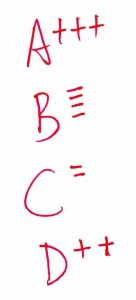If you are a professor, you know that some of your colleagues are very strict, unforgiving, and generally difficult when it comes to dealing with undergraduate students. It seems they have a grudge against students and want to make sure that they struggle, if not fail. In my experience, these kinds of professors are the exception, not the rule.
Most professors play a large but unheralded role in ensuring student success. Yes, students have a lot to do with their own success, but professors do too. They give significant amounts of personal attention to students to help ensure they succeed in the course and in their degree program. They give students lots of little breaks – sometimes big breaks – to help them move along to the next step in their education and in life. It has nothing to do with being liked. It is a practical response to life’s many unusual and unpredictable circumstances.
There are innumerable situations that students run into that require the professor to be flexible (here is short list). Variation can be both time-consuming and annoying. In truth, all professors would like course rules to be followed exactly, with no exceptions. But, that is not reality. The professors who are inflexible are unrealistic and create negative learning experiences for affected students and other students to whom they tell their stories to. Such professors probably should not be teaching.
 My father was a career university professor and long-time department chair. He was the rare full professor who insisted on teaching courses to undergraduates – one for non-science majors with 100 or so students and two for geology majors with 30 or so students each, plus his graduate courses (a total of three per semester). He gave students lots of breaks when the situation legitimately warranted it. One example is the way he graded undergraduate students’ performance on exams (he graded all exams himself; no teaching assistants). He was not a straight-up A-B-C-D-F grader, which was the official university grading system (no plus or minus allowed for final grades). Instead, his grading was more nuanced carried implied performance messages. The image at right shows an example of how he graded exams.
My father was a career university professor and long-time department chair. He was the rare full professor who insisted on teaching courses to undergraduates – one for non-science majors with 100 or so students and two for geology majors with 30 or so students each, plus his graduate courses (a total of three per semester). He gave students lots of breaks when the situation legitimately warranted it. One example is the way he graded undergraduate students’ performance on exams (he graded all exams himself; no teaching assistants). He was not a straight-up A-B-C-D-F grader, which was the official university grading system (no plus or minus allowed for final grades). Instead, his grading was more nuanced carried implied performance messages. The image at right shows an example of how he graded exams.
A+++ meant you were doing really well; keep up the good work. B- – – – meant you are seriously close to getting a C next time if you don’t study harder. It also means “I’ll do a lot to help you avoid getting a C.” C- – meant you are falling below C average and need to work harder. D++ means you might be able to pull your grade up to a C next time. It also means “I’m trying to help you not fail.” The grading system he used quietly transmitted positive emotional and work-related messages to students.
Recognize that this comes from someone who was a straight-A student in in every subject, in a strict pre-World War II Italian public grade school and university system (Bologna). His early avocation life was to study and learn as much as he could – math, physics, chemistry, biology, geology, literature, history, religion – you name it – often by skipping class, teaching himself, and showing up for the test (much to the consternation of his professors). My father was hugely motivated and had enormously high standards. But, he recognized the reality that not every student was like him. Realism is an important quality for a professor to have.
And, he did not discriminate against the poor performing students. He was always available to explain things and help them improve through personal tutoring. On many occasions he would have lunch with them or a beer after work in the Rathskeller (in his engraved pewter mug, a family treasure now in the hands of my son Michael; drinking age was 18 at the time). When it came time to input final grades into the computer system, my father obviously had to make some adjustments to reconcile his grading system with the university’s. I do not know the details, but my bet is that it was mostly in student’s favor. He wanted to see them succeed in life as well as in school.
But, things are changing. As more teaching goes from face-to-face to hybrid to fully online over time, one can expect the professors’ interaction to go from high touch to low touch to no touch for some, perhaps many, courses. We should not lament that change. After all, things change – that is just reality. Remember, we used to get great personal attention at gas stations and department stores. That has changed. We used to get great personal attention on airline flights and at the doctor’s office. That too has changed.
It will be interesting to see how students do when nobody is around to give them any breaks, or when “the system” – the computerized learning management system – won’t let the instructor (facilitator?) give breaks to students who legitimately deserve a break. Will students be more or less successful than they are now, in the waning era of close faculty-student interaction? Lower cost online courses and degree programs could have some interesting unintended consequences.
